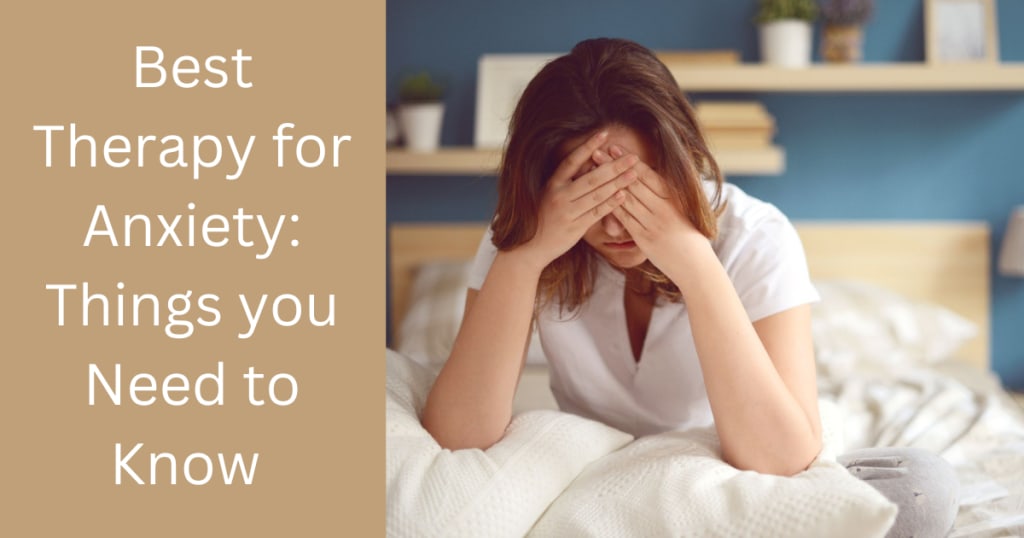Best Therapy for Anxiety: Things You Need to Know
Therapy for Anxiety Treatments

If you have experienced sensations such as a tight chest, dry mouth, or unexplained irritability, it's possible that you are dealing with anxiety. The positive aspect is that anxiety can be managed and treated, and it doesn't have to take over your life. However, therapy is an essential component of effectively addressing and managing anxiety. In this blog, we'll discuss what you need to know to find the best therapy for anxiety.
Understanding Anxiety
Before we dive into therapy options, it's essential to understand what anxiety is and what causes it. Millions of individuals worldwide are impacted by anxiety, which is a prevalent psychological issue. Anxiety is a natural response to stress or danger, but when it becomes chronic and excessive, it can interfere with daily life. While it's normal to experience some level of anxiety from time to time, chronic and excessive anxiety can cause significant distress and interfere with daily activities. Anxiety can manifest in various forms, such as panic attacks, generalized anxiety disorder, social anxiety disorder, and specific phobias. Fortunately, therapy can be a highly effective treatment option for anxiety.
The feeling of Chest Heaviness Due to Anxiety
One of the physical symptoms of anxiety is chest heaviness or tightness. It's a common symptom that can be both alarming and uncomfortable. People with anxiety often describe it as feeling like a weight on their chest or a tight band around their ribcage. Chest heaviness anxiety is a result of the body's physiological response to fear and stress. During an anxiety episode, the body releases stress hormones, causing the muscles to tighten, including those in the chest, leading to the feeling of heaviness.
Types of Therapy for Anxiety
Now that we understood what anxiety is let's explore different types of therapy that can be effective in treating it:
Cognitive-Behavioral Therapy (CBT)
CBT is a kind of therapy that helps people identify and change disordered thinking patterns and behaviors that contribute to their anxiety. It helps patients to identify triggers, develop coping mechanisms, and challenge negative beliefs. Cognitive-behavioral therapy is one of the most effective types of therapy for young adults with anxiety. It is particularly effective for young adults with specific phobias, such as a fear of flying or public speaking.
Exposure Therapy
Exposure therapy is a type of therapy that gradually exposes people to their fears or phobias, allowing them to learn how to cope with them. The therapist works with the patient to create a hierarchy of anxiety-provoking situations, starting with the least threatening and progressing to the most challenging. By gradually exposing patients to these situations, they allow them to confront their fears and overcome them.
Mindfulness-Based Therapy
Mindfulness-based therapy is a type of therapy that teaches people to be more present in the moment and non-judgmental of their thoughts and feelings. It involves a combination of meditation, yoga, and other mindfulness techniques that can help people reduce anxiety and stress. By practicing mindfulness, patients learn to focus on the present moment and let go of worries about the future or past, reducing anxiety symptoms.
Medication
In some cases, medication may be necessary to treat anxiety. Antidepressants and anti-anxiety medications can help regulate the chemicals in the brain that cause anxiety symptoms. However, medication should be used in conjunction with therapy, and patients should always consult their doctor before starting any new medication.
Acceptance and Commitment Therapy (ACT)
ACT encourages patients to accept their thoughts and feelings and commit to taking positive action towards their goals, despite anxiety.
Final Thoughts
Anxiety is a challenging condition, but therapy can be an effective treatment option. By working with a therapist, patients can learn coping mechanisms and strategies to manage their anxiety symptoms. Cognitive-behavioral therapy, exposure therapy, mindfulness-based therapy, and medication are all potential options for treating anxiety. If you're struggling with anxiety, reach out to a mental health professional to discuss which treatment option is best for you. Remember, anxiety is treatable, and there is hope for recovery.
Originally Published at: https://www.professionalsuk.co.uk/article/health-medical/11605/best-therapy-for-anxiety-things-you-need-to-know
About the Creator
CBT DBT Associates
CBT/DBT Associates is a specializing in cognitive behavioral therapy and dialectical behavior therapy in NYC for children, adolescents, and adults, under the directorship of Lisa A. Napolitano, Ph.D. Get in touch for more information.






Comments
There are no comments for this story
Be the first to respond and start the conversation.